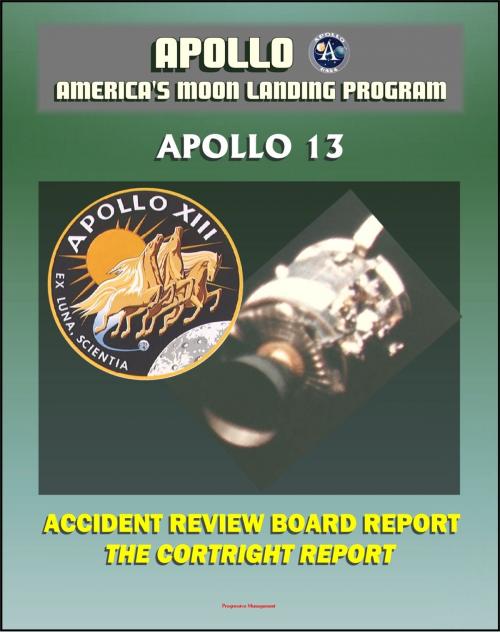Apollo and America's Moon Landing Program: Apollo 13 Accident Cortright Review Board Report with Findings and Recommendations about the In-flight Oxygen Tank Explosion - Lovell, Haise, and Swigert
Nonfiction, Science & Nature, Science, Physics, Astronomy, History, Americas| Author: | Progressive Management | ISBN: | 9781465937490 |
| Publisher: | Progressive Management | Publication: | November 26, 2011 |
| Imprint: | Smashwords Edition | Language: | English |
| Author: | Progressive Management |
| ISBN: | 9781465937490 |
| Publisher: | Progressive Management |
| Publication: | November 26, 2011 |
| Imprint: | Smashwords Edition |
| Language: | English |
Converted for accurate flowing-text e-book format reproduction, this NASA accident investigation board report - named after its chairman, Edgar Cortright - provides unique details, including a complete incident timeline, about the causes of the Apollo 13 accident in April 1970. The Apollo 13 mission, planned as a lunar landing in the Fra Mauro area, was aborted because of an abrupt loss of service module cryogenic oxygen associated with a fire in one of the two tanks at approximately 56 hours. The lunar module provided the necessary support to sustain a minimum operational condition for a safe return to earth.
The Apollo 13 Review Board was charged with the responsibilities of reviewing the circumstances surrounding the accident, of establishing the probable causes of the accident, of assessing the effectiveness of flight recovery actions, of reporting these findings, and of developing recommendations for corrective or other actions. The Board has made every effort to carry out its assignment in a thorough, objective, and impartial manner. In doing so, the Board made effective use of the failure analyses and corrective action studies carried out by the Manned Spacecraft Center and was very impressed with the dedication and objectivity of this effort. It became clear in the course of the Board's review that the accident during the Apollo 13 mission was initiated in the service module cryogenic oxygen tank no. 2. The accident is judged to have been nearly catastrophic. Only outstanding performance on the part of the crew, Mission Control, and other members of the team which supported the operations successfully returned the crew to Earth. The first determination of fifty made by the board stated:
The cause of the failure of oxygen tank no. 2 was combustion within the tank. Analysis showed that the electrical energy flowing into the tank could not account for the observed increases in pressure and temperature. The heater, temperature sensor, and quantity probe did not initiate the accident sequence. The cause of the combustion was most probably the ignition of Teflon wire insulation on the fan motor wires, caused by electric arcs in this wiring. The protective thermostatic switches on the heaters in oxygen tank no. 2 failed closed during the initial portion of the first special detanking operation. This subjected the wiring in the vicinity of the heaters to very high temperatures which have been subsequently shown to severely degrade Teflon insulation.
Converted for accurate flowing-text e-book format reproduction, this NASA accident investigation board report - named after its chairman, Edgar Cortright - provides unique details, including a complete incident timeline, about the causes of the Apollo 13 accident in April 1970. The Apollo 13 mission, planned as a lunar landing in the Fra Mauro area, was aborted because of an abrupt loss of service module cryogenic oxygen associated with a fire in one of the two tanks at approximately 56 hours. The lunar module provided the necessary support to sustain a minimum operational condition for a safe return to earth.
The Apollo 13 Review Board was charged with the responsibilities of reviewing the circumstances surrounding the accident, of establishing the probable causes of the accident, of assessing the effectiveness of flight recovery actions, of reporting these findings, and of developing recommendations for corrective or other actions. The Board has made every effort to carry out its assignment in a thorough, objective, and impartial manner. In doing so, the Board made effective use of the failure analyses and corrective action studies carried out by the Manned Spacecraft Center and was very impressed with the dedication and objectivity of this effort. It became clear in the course of the Board's review that the accident during the Apollo 13 mission was initiated in the service module cryogenic oxygen tank no. 2. The accident is judged to have been nearly catastrophic. Only outstanding performance on the part of the crew, Mission Control, and other members of the team which supported the operations successfully returned the crew to Earth. The first determination of fifty made by the board stated:
The cause of the failure of oxygen tank no. 2 was combustion within the tank. Analysis showed that the electrical energy flowing into the tank could not account for the observed increases in pressure and temperature. The heater, temperature sensor, and quantity probe did not initiate the accident sequence. The cause of the combustion was most probably the ignition of Teflon wire insulation on the fan motor wires, caused by electric arcs in this wiring. The protective thermostatic switches on the heaters in oxygen tank no. 2 failed closed during the initial portion of the first special detanking operation. This subjected the wiring in the vicinity of the heaters to very high temperatures which have been subsequently shown to severely degrade Teflon insulation.















